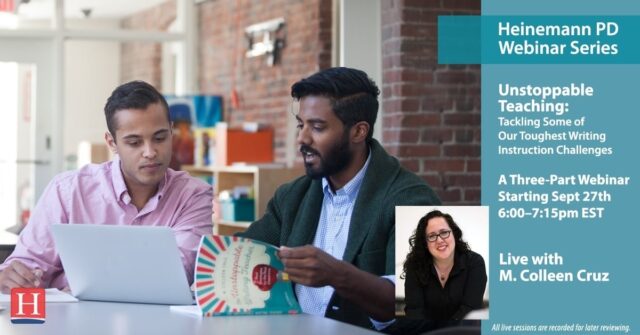
I am sure you have had those moments in your classroom where your students are completely engaged in the process of learning, where magic happens in surprising ways. Mihaly Csikszentmihalyi’s identifies this immersion in a task as “flow,” which he describes as “a sense of merging with the activity” (2000). It’s what we imagine will happen when we enter our classroom in the first place. However, with the disruptions and demands on our work, it can be hard to maintain. Csikszentmihalyi’s research explains that people can find that flow if they have “very high levels of intrinsic motivation . . . marked by . . . strong interest and involvement in the work” (2000). Our challenge is to figure out how to do this in our daily work of teaching.
I am sure you have had those moments in your classroom where your students are completely engaged in the process of learning, where magic happens in surprising ways. Mihaly Csikszentmihalyi’s identifies this immersion in a task as “flow,” which he describes as “a sense of merging with the activity” (2000). It’s what we imagine will happen when we enter our classroom in the first place. However, with the disruptions and demands on our work, it can be hard to maintain. Csikszentmihalyi’s research explains that people can find that flow if they have “very high levels of intrinsic motivation . . . marked by . . . strong interest and involvement in the work” (2000). Our challenge is to figure out how to do this in our daily work of teaching.
According to author Daniel Pink, when dealing with work that is complex and that requires creativity—basically, work like ours—people need three things to feel motivated: autonomy, mastery, and purpose. The more that you strive to bring these three factors under your control, the more likely you are to have the strong internal motivation that you need to drive your work (2009).
Autonomy
In this time of public scrutiny of education, it’s not uncommon for teachers to feel that they need permission to act in large and small ways: to reframe curriculum to meet the needs of students, to apply for grants for things needed in the classroom, or permission to organize an event for parents in the community. When we don’t get that permission, it chips away at our sense of autonomy. But remember that we are the experts of our craft. While we know to keep an open mind toward ideas from colleagues, parents, and administration, we must not let outside input paralyze our own sound judgment about what is good for our kids.
Another unintended consequence of loss of autonomy is how it makes us stagnant as teachers; it brings the evolution of our teaching practice to a disheartening halt. Instead of moving forward on challenges that we can address, we may find ourselves doing nothing at all. This is probably the worst consequence of disempowerment of educators in our times.
Without autonomy, work can feel like nothing more than drudgery. As Csikszentmihalyi explains, “when we feel that we are investing attention in a task against our will, it is as if our psychic energy is being wasted. Instead of helping us to reach our own goals, it is called upon to make someone else’s dream come true” (2008, 160). Often, the struggle for autonomy isn’t always based on external factors or permissions. Often, our doubts hold us back from taking our own ideas seriously and implementing them. If you struggle with these doubts, consider these questions:
When have you felt that you could act autonomously in your work in the past school year?
When have you felt that you needed permission from others?
When did your hesitation keep you from seizing a great opportunity for your students?
Mastery
In our work, mastery does not mean perfection: we are not programming droids, but rather we play an essential role in shaping the learning lives of young people. However, it does mean we must continue the deliberate act of reflection on our actions and relentlessly pursue improvement. We will never reach a fulfilling end point in our work because our craft will continue to evolve. Each year, we meet a new set of students who will teach us things as well. Sarah Brown Wessling, 2010 National Teacher of the Year, put it best, “I have horrible lessons too. Of course I do. . . . Every variety of failure and misstep: I’ve done it. But I’m not afraid of mistakes and I’m not ashamed of them. I learn and tweak and grow and get better, not because I was ever perfect to begin with, but because I am compelled to get it right . . . eventually” (2013). In this constant pursuit, we hone our art. As you begin the year, you may want to consider these questions, discuss them with your colleagues, and even set a few goals as a way to keep them on your radar throughout your daily life of teaching:
What am I trying to master this year? How am I challenging myself?
What will make me feel stronger for having accomplished this year?
How am I finding intellectual joy in the work that I am doing this year?
Purpose
Unlike other careers where a worker might wonder how selling her quota of widgets makes the world a better place, we already know. It’s one of the best parts of being a teacher. We have a clear purpose. When we stay at school past 7 pm on a Friday night, we don’t wonder why we are doing the work. We understand that the work we do matters because we see the future problem-solvers, tinkerers, and innovators of our country each day in our classroom. We understand our problems—war, poverty, and climate change—are in the hands of our students and they will have the power to change the course of our fate as humanity. We work to prepare them to meet that challenge.
What is the work, the goal, the project, or the student that gives you purpose?
When have you not been able to keep purpose at the forefront of your work with students?
At what point in the day/year is your purpose crystal clear to you? When is it hard to grasp?
When we view our work through the lenses of gaining autonomy, working toward mastery, and recognizing the true purpose of our work, we jump-start our own intrinsic motivation and open ourselves to master the intellectual challenges that we will face continuously in our daily work.
• • •
We know this time of year can be difficult for many classroom teachers. We’ve pulled together some of our best resources to help you beat the burnout. Find articles like this, and more at Heinemann.com/burnout. Don’t burn out, ignite!
• • •
The above was excerpted from Thrive: 5 Ways to (re)Invigorate Your Teaching, by Meenoo Rami.


